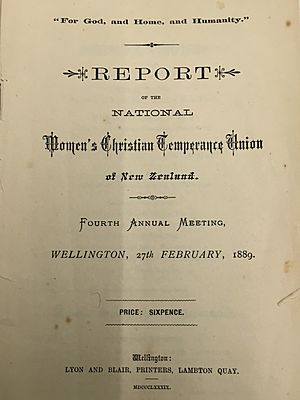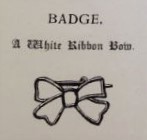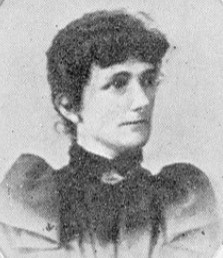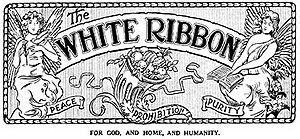Women's Christian Temperance Union New Zealand facts for kids
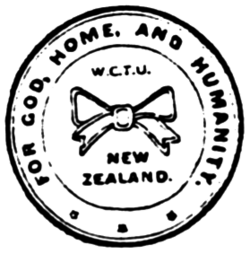 |
|
| Abbreviation | WCTU NZ |
|---|---|
| Founded | 1885 |
| Founded at | Wellington, New Zealand |
| Type | Umbrella organisation |
| Legal status | Charitable trust |
| Focus | temperance, protection of women and children]] |
|
President
|
Annette Paterson (2012–present) |
The Women's Christian Temperance Union of New Zealand (WCTU NZ) is a group that works to help communities in New Zealand. It is the oldest national women's group in the country that has been active without stopping. It is not connected to any political party or specific church.
The group started in 1885 when Mary Clement Leavitt, a missionary from the world's Woman's Christian Temperance Union, visited New Zealand. The WCTU NZ became a founding member of the National Council of Women of New Zealand. While it is a women's group, men can also join as honorary members.
Contents
What is the WCTU NZ's Goal?
The main goal of the WCTU NZ is to improve people's health and solve social problems. They do this by encouraging a lifestyle that is free from alcohol and other harmful substances.
Over the years, new members have taken a pledge, or a solemn promise, to support this goal. One of the pledges was: "I hereby solemnly promise, God being my helper, to abstain from all distilled, fermented, and malt liquors, including wine, beer, and cider, and to employ all proper means to discourage the use of and traffic in the same." This means they promised not to drink alcohol and to encourage others to do the same.
Symbols and Watchwords
The White Ribbon
The official symbol of the WCTU is a white ribbon. It is usually worn as a bow pinned over the heart. The white ribbon stands for purity and connects Christian women working for the same cause all over the world. In the early days in New Zealand, members often wore it with a blue ribbon, which was a symbol of the Gospel Temperance movement.
Watchwords
The WCTU has three main "watchwords" that guide its work:
- Educate! - Teaching people about the group's goals.
- Agitate! - Speaking up and campaigning for change.
- Legislate! - Working to change laws to protect people.
Early Work of the WCTU NZ
When the WCTU NZ started, its members worked hard to change laws and improve life for women and children.
Temperance and Women's Right to Vote
The main focus of the WCTU NZ was the temperance movement. This was a campaign to reduce the harm caused by alcohol. Members believed that alcohol was the cause of many problems for families and society.
They quickly realized that to change the laws about alcohol, they needed a voice in government. At the time, women in New Zealand could not vote in national elections. The WCTU NZ became a leading force in the fight for women's suffrage, which is the right for women to vote.
The group organized huge petitions to show Parliament how many women wanted the right to vote.
- In 1891, petitions with over 10,000 signatures were presented.
- In 1892, they gathered over 20,000 signatures.
- In 1893, they presented a massive petition with almost 32,000 signatures. The petition was so long—about 270 meters—that it had to be rolled into Parliament on a wheelbarrow!
Thanks to the hard work of the WCTU NZ and other activists like Kate Sheppard, New Zealand became the first country in the world where all women won the right to vote in national elections in 1893.
Protecting Women and Children
The WCTU NZ also worked on other important issues:
- Safe Workplaces: They campaigned against the poor and unsafe working conditions for women who worked as barmaids.
- Fair Laws: They fought to repeal the Contagious Diseases Act of 1869. This was an unfair law that targeted and punished women for public health problems.
- Child Welfare: They pushed for "scientific temperance instruction" in schools. This meant teaching children about the health risks of alcohol and tobacco. They also created youth groups called Loyal Temperance Legions.
- Community Support: WCTU NZ members set up hospitals, homes for sailors, girls' hostels, and free kindergartens. They provided help and resources for people in need.
The White Ribbon Journal
In May 1895, the WCTU NZ began publishing its own journal called The White Ribbon. This magazine shared news and stories about the group's work. The famous suffragist Kate Sheppard was its first editor. The journal was published for many years, later becoming the New Zealand White Ribbon Digest. Today, the WCTU NZ continues to publish a newsletter called the White Ribbon Bulletin.
WCTU NZ Leadership
Many dedicated women have led the WCTU NZ since it was founded. The first president was Anne Ward. Other important early presidents included Emma Packe, Catherine Fulton, and Annie Jane Schnackenberg. These leaders helped build the organization and guided its most important campaigns, including the successful fight for the right to vote.
The WCTU NZ Today
Over the years, the WCTU NZ has changed, but it continues its work. While membership is smaller than in the past, the group still holds yearly meetings and is active in the World WCTU.
The WCTU NZ is proud of its history, especially its key role in making New Zealand the first country to grant women the right to vote. The group continues to promote health and well-being in communities across New Zealand.
Images for kids
See also
- Alcohol in New Zealand
- List of New Zealand suffragists
- National Council of Women of New Zealand
- Temperance movement in New Zealand


